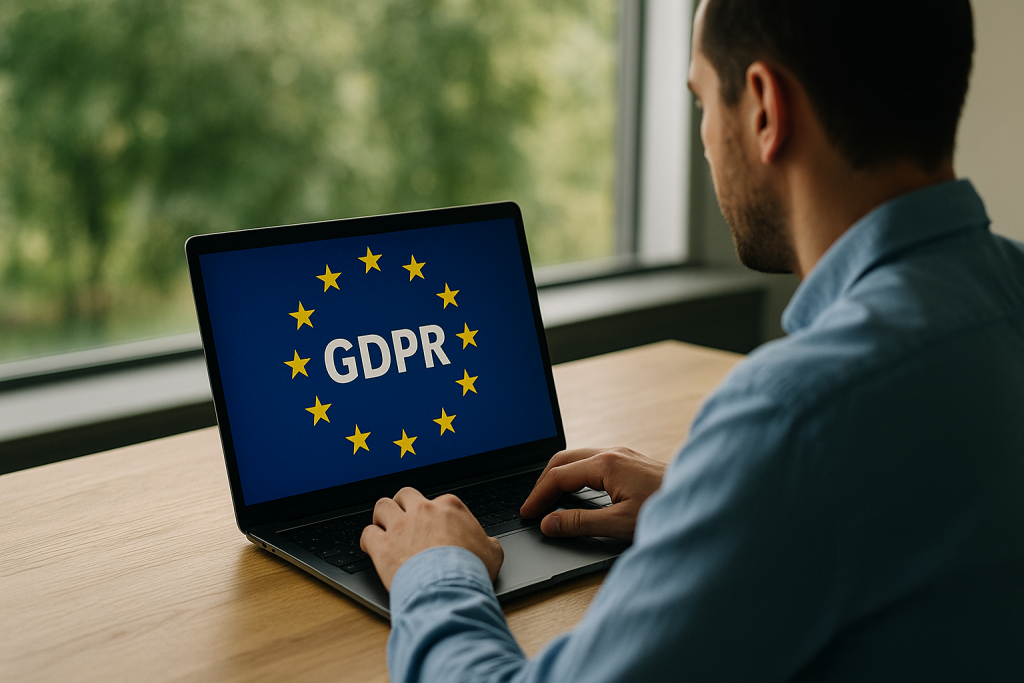In today’s connected world, your business doesn’t have to be based in Europe to be affected by European law. One regulation in particular—the GDPR—still catches Australian businesses off guard, even seven years after it came into force.
If your company collects or uses the personal data of people in Europe, you may have legal obligations under the General Data Protection Regulation (GDPR), no matter where your office is. And in 2025, enforcement is only getting stricter.
But here’s the good news: with the right advice and a bit of planning, compliance is achievable—and it may even give your business a competitive edge.
What Is the GDPR, and Why Does It Affect Australians?
The GDPR is the European Union’s privacy law. It was introduced in 2018 to give people more control over how companies use their personal data.
What makes the GDPR unique is that it doesn’t just apply to businesses based in Europe. It applies to anyone, anywhere who collects or processes the data of people in the EU. That includes Australian companies that:
- Sell goods or services to customers in Europe (even digital ones)
- Run a website that targets or tracks EU users
- Use tools like Google Analytics, Facebook Pixel or email marketing platforms that capture data from EU users
In other words, if your business touches EU data, the GDPR probably touches you.
So What Does the GDPR Actually Require?
At its core, the GDPR is about transparency, control, and security. Businesses must:
- Tell people exactly what data is being collected and why
- Only collect what they genuinely need
- Keep that data safe
- Give users a say in how their data is used
People in the EU have strong rights under the GDPR, including:
- The right to see what data you hold about them
- The right to correct wrong information
- The right to delete their data (the “right to be forgotten”)
- The right to say no to certain uses (like marketing)
Consent Isn’t What It Used to Be
You might think your website is fine because it has a cookie banner or privacy policy. But in 2024 and 2025, European regulators have made it clear: not all consent is valid consent.
✅ Consent must be clear, specific, and freely given
❌ Pre-ticked boxes, vague wording, or “by continuing to use this site, you agree…” are no longer enough
This is especially important for websites using cookies, tracking tools, or third-party advertising platforms. If any of these collect data from EU users, you’ll need a proper consent mechanism—and you may need to switch to EU-friendly tools.
What If I Send Data Overseas?
The GDPR also puts limits on where personal data can be sent. Australia is not currently recognised as having “adequate” privacy protections under EU law, so if you receive personal data from the EU, you may need to use something called Standard Contractual Clauses (SCCs) to make the transfer legal.

In plain English: if your business stores or receives data from the EU—through email lists, cloud tools, marketing platforms, or anything else—you need a lawful way to do it. And that often means adding the right legal language to your contracts.
What Happens If You Don’t Comply?
Non-compliance with the GDPR can lead to serious fines. Some of the highest-profile cases include:
- Meta (Facebook) – fined €1.2 billion for illegal data transfers
- Google – fined hundreds of millions for breaching cookie consent rules
- Clearview AI – fined for scraping images from the internet without consent
You might be thinking: I’m a small business, not a tech giant. Surely they won’t come after me?
But enforcement isn’t just for the big players. European regulators are now targeting any business that handles EU data—especially if complaints are made or if there’s a data breach.
What About Australian Privacy Laws?
Australia’s own privacy laws are about to change. A major overhaul of the Privacy Act 1988 (Cth) is coming, and many of the proposed reforms mirror the GDPR. These include:
- Stricter rules around consent
- Higher penalties (up to $50 million)
- A direct right for individuals to sue for serious privacy breaches
- New rules around children’s data and automated decision-making
So even if the GDPR doesn’t apply to you now, Australian law soon might.
What Should Your Business Do?
Here’s a practical starting point for any Australian business:
- Find out if the GDPR applies – Do you have customers, users or website traffic from the EU?
- Check your consent practices – Are your cookie banners and sign-up forms compliant?
- Review your privacy policy – Does it explain what you do with data in clear, plain English?
- Update contracts and systems – Are your overseas data transfers legally covered?
- Train your team – Do staff know how to handle data properly?
Taking action now can protect your business—not just from fines, but from reputational harm and customer complaints.
Final Thoughts
In 2025, the message is clear: privacy compliance is no longer a “nice-to-have”. It’s a core business responsibility. And with both European and Australian regulators stepping up enforcement, ignoring privacy risks is no longer an option.
But with good legal advice and the right support, you can stay ahead of the curve.
At Boettcher Law, we help Australian businesses make sense of privacy law—whether it’s local, international, or somewhere in between.
Get in touch today to see how we can help you protect your business and your customers’ trust.